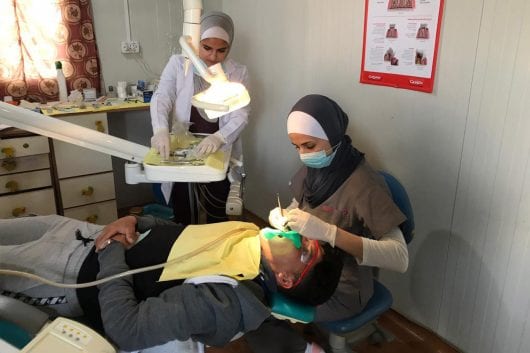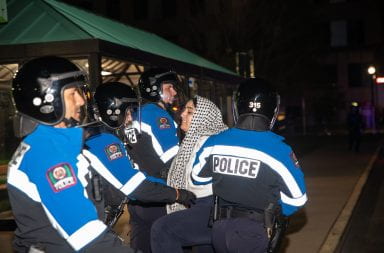
The Arab Dental Society will be serving Syrian refugees in Jordan as part of a their first annual service trip. Credit: Courtesy of Atlantic Humanitarian Relief
The Arab Dental Society leaves next month for Al Zaatari Camp in Jordan — the world’s largest Syrian Refugee Camp — on a trip that board members Dana Akel and Sami Mubarak still view with a degree of disbelief.
The newly established Arab Dental Society was founded in the fall by students driven by sharing their passion of dentistry, giving back to the refugee community and having Arab voices represented at the College of Dentistry.
It is because of these highly motivated individuals that the club accomplished so much in such little time, Akel, the clinic coordinator of ADS and third-year in dentistry, said.
Mubarak, president and co-founder of ADS, said the group’s efforts have been met with positive feedback at various events from students, parents, faculty and the College of Dentistry.
“At times, I feel like they want us to slow down because it does get overwhelming,” Mubarak, a second-year in dentistry, said.
But this is advice they won’t be taking because of how crucial they consider their work to be.
The club will collaborate with the Jordan registered nonprofit, Atlantic Humanitarian Relief — a medical relief organization. The nonprofit will oversee this year’s annual service trip and supply the Ohio State team with dental equipment using donations the Arab Dental Society raised through their GoFundMe campaign and proceeds made during Arab Student Union’s Arab Night on March 3.
The Ohio State team will provide free treatment, distribute free dental supplies and deliver oral hygiene education to schoolchildren throughout the weeklong trip, lasting from April 26 through May 4.
Inevitably, there is a learning curve when serving refugees, Akel said. Many refugee camps don’t have a proper clinic, with operations often happening on tables and doctors working on their knees in a field, she added.
The team will go to an established clinic where there are dental chairs and systems in place, according to Akel.
“You’re exposed to an OSU dental clinic, where everything is semiperfect, versus a refugee camp where the hygiene is not the best,” she said. “Even the patients are different, they may have psychiatric issues, anxiety disorders … who knows.”
Mubarak offered a solution to bridge the differences.
“Showing empathy and knowing what these refugees have been through is key,” Mubarak said. “Of the volunteers that are going, a few of them are not Arab. So they’re not well aware of what these kids have been through.”
In view of this, information sessions educating the non-Arab volunteers about the Syrian conflict will be held in the weeks leading up to the service trip.
Both Akel and Mubarak have witnessed the state of health care in refugee camps and feel compelled to be at the forefront of the efforts to combat an issue close to them.
Akel, a Syrian-American, moved to the United States in 2012 to pursue an education and escape the Syrian civil war.
“It’s a responsibility on us who are more lucky to get help to the underprivileged,” Akel said about aiding her fellow Syrians.
Mubarak, a descendant of Palestinian refugees, said living in Palestine for six years has helped shape his outlook.
“I’ve experienced oppression and injustice, and I’ve seen limited access to health care,” Mubarak said. “Those life experiences have embedded this compassion in me to always help those in need and empower those that are unheard.”
Although the students’ life goals are on their way to being accomplished, the planning and commitment poured into their service trip have taken a toll — especially on Akel and Mubarak’s schoolwork.
“Second year of dental school is the hardest year, and being involved can affect your grades and it has affected my grades,” Mubarak said. “But for me, I feel like I have a moral obligation and responsibility. If I know I have the opportunity to help people out, I gotta go for it.”
Akel said she is especially motivated by the stories shared by her contact at the Jordanian camp.
It’s hearing these stories of the underserved Syrians that makes her question which is more important: her grades or organizing the initiative she’s been craving since her undergraduate years.
Since she was a pre-dental student, she’s wanted to take part in a service trip, but always withdrew at the last minute because she felt like an escort or translator.
“I wanted to do treatment,” Akel said. “I wanted to do more than just being a volunteer that translates for the American doctors.”
This year’s service trip is centered around an Arab cause, but the club is humanitarian in nature and plans on uplifting the Arab name by contributing to various causes in the future, Akel said.
“Because this is our first service trip, we wanted to be in an area we’re familiar with, with a population we’re familiar with,” Mubarak said.
Also accompanying the team will be faculty member Dr. Reza Heshmati, an associate professor at the College of Dentistry, who said one of the goals of the trip is to inaugurate a system using the fluoride treatment that will continue even after they leave.
“We’re trying to see if we can establish somebody in the clinic to do [the fluoride treatment], on a two weeks basis,” Heshmati said. “We need to have somebody continue that procedure. Even if we end up paying for that person by fundraising.”
Given the circumstances of the children at the camp, it’s proved to be most helpful when they’re given a smaller dosage of the fluoride treatment with higher frequencies, Heshmati said.
Hiring a dental nurse is one way of ensuring these children receive effective help even after the team leaves. Another way is by appealing to the respective Ohio State colleges and getting approval for a biannual service trip, he said.
With the Syrian refugee crisis being one of the most devastating ongoing crises in the world, both Mubarak and Akel said the highlight of their trip will be meeting the faces behind the statistics — the children at the camp who Mubarak described as mature beyond their years.
“I want to hear their stories, I want to connect with them and just alleviate their pain,” Mubarak said. “I want to teach them dabke (a common Levantine folk dance). Just seeing that smile on their face after, that’s going to mean the world to me.”
It’s that very smile Dana Akel and Sami Mubarak describe as the ultimate purpose of their trip.


